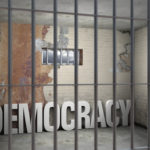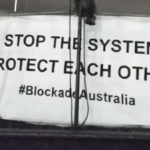Governments Criminalise Protest to Silence Dissent: An Interview With Dr Piero Moraro

The right to protest is under threat in this country, as government has been conducting an all-out assault on mobilising and assembling over recent years. And as this nation remains the only western democracy without a federal bill of rights, the right to protest isn’t directly protected under law.
There are only five rights overtly protected in the Australian Constitution, and none of them have any bearing on political protest. However, the High Court ruled in 1992 that the right to freedom of political communication is implied in the nation’s founding document.
Tasmania’s 2014 Protesters Act is often cited as the beginning of the current crackdown on public demonstrations. And former Australian Greens leader Bob Brown challenged the validity of some of the laws contained within this legislation, after he was charged under them.
The majority of the highest court ruled in October 2017 that the laws did contravene the implied right of political expression as they deterred protests. However, while this ruling does have bearing on anti-protest laws around the country, governments are simply continuing to pass more.
Orwellian reach
This week the Queensland government is attempting to fast-track anti-protest laws in response to ever-increasing climate activism. Brisbane has been a flashpoint of Extinction Rebellion protests recently. And now premier Annastacia Palaszczuk wants to see these disrupters serve hard time.
And she’s not alone. Australian home affairs minister Peter Dutton has been on AM radio again, this time calling for mandatory sentencing laws to deal with climate activists. And further, he suggested that the welfare payments of activists be cut off.
Meanwhile, south of the border in NSW, the Berejiklian government has introduced its Right to Farm Bill. It’s aimed at animal rights activists and proposes to dramatically increase the penalties that apply to aggravated trespass upon inclosed lands.
However, while both these state laws ostensibly target either climate protesters or animal welfare demonstrators, they actually take aim at all citizens’ rights to effectively assemble and speak out against the actions of government and corporates.
Outlawing opposition
Charles Sturt University criminal justice lecturer Dr Piero Moraro has been tracking these encroachments upon political expression. The doctor recently spoke at a Sydney University seminar on Extinction Rebellion (XR), in which anti-protest laws were scrutinised.
Dr Moraro’s book Civil Disobedience: A Philosophical Overview was published in August. In it, he explores the intersection between protest and the rule of law, which is timely considering the rise of XR and its foundation in nonviolent civil disobedience.
Sydney Criminal Lawyers spoke with Dr Piero Moraro about the nationwide trend in governments passing laws to crackdown on demonstrations, the impact it’s having on the ground, and his thoughts on how the Extinction Rebellion movement is mobilising.
Firstly, last week saw nationwide Extinction Rebellion protests cause disruption in cities across the nation. The climate movement uses nonviolent direct action to get its message across.
In response to six months of XR protests in Queensland, the Palaszczuk government is fast-tracking extremely punitive anti-protest laws. What are your thoughts on these laws, as well as the way the Queensland government has gone about framing its response?
The main problem that many people have raised is that it’s unclear why these laws are necessary. It’s not clear what kind of threat these protesters are posing to the community at large.
The Queensland premier has framed it is in terms of it being a threat to people’s safety. She argues that protesters are using strategies that are “sinister” and cause physical threats to other people.
Basically, protesters are locking themselves onto each other, vehicles, gates or light poles. She claims that the instruments they’re using to lock themselves on might be harmful to police, when they eventually come to cut them out of the lock.
But, even the police have said that this is not the case. That’s not what’s happening.
A puzzling point was that in the Twitter post that she made to advertise these new protest laws, Palaszczuk used a photo of a protest from three years ago, which wasn’t part of Extinction Rebellion. It was a different protest by students at a different event.
So, it was already framed in ways that were quite dubious. And also, the wording that she used to describe these protesters – stupid, dangerous, posing harm to other people, non-peaceful – doesn’t seem to match what the reality of these protests is.
They are disruptive for sure, but they are still nonviolent. These locking devices don’t contain anything dangerous for whoever it is that has to cut them out.
It’s hard not to suspect that there’s an attempt to describe these protesters as something else so as to be able to introduce new legislation, as is happening, to deter other protesters.
These protests are causing a disruption, which the government cannot ignore, like it usually does when there’s some form of protest.
Now, the government is in a corner having to either acknowledge the message of the Extinction Rebellion movement – by sitting down and considering the alternatives to the coal industry – or it can choose the alternative of describing these people as outlaws – as criminals – who have to be stopped.
And that seems to be the way that Queensland is going right now.
In NSW, we’re facing the proposed Right to Farm Bill, which contains fresh anti-protest laws that on the surface target animal rights activists, but when you dig deeper they have implications for the right to protest in general.
What’s your opinion on the right to farm measures? And is the act of seeming to legislate against a certain cohort, while concealing wider implications, a common thread in enacting anti-protest laws?
We’ve seen this a few years ago – in 2016 – when the NSW government introduced an inclosed lands bill, with laws it proposed were for the safety of workers.
The Right to Farm Bill is said to protect the safety of farmers. But, when you look at it, farmers feature very little. It’s more about the business side.
Also, there’s a shift to the use of the word “hinder”. So, any activity that might hinder the working of a certain business.
Many critics have pointed out that what has been presented as a law targeting specifically one kind of protest – against one kind of group – might actually be able to capture much more than that.
For example, any kind of anti-government or anti-business protests might be targeted by this legislation.
In early 2019, the government introduced another bill to protect farmers from people criticising the activities of certain abattoirs and farms.
And similarly, what was supposed to be a specific law to protect the safety of farmers was, in practice, a law targeting whoever might cause damage to business. The concern is not with the safety of the person, but with the profit-making result of the business.
Again, whoever tries to criticise a company and therefore, might cause a loss in profit will be targeted as an extremist and a criminal, even if they’re not doing anything to threaten the personal safety of workers.
As you’ve mentioned, the NSW government has already been passing a suite of anti-protest laws over recent years. There was 2015’s biosecurity laws, 2016’s interfering on inclosed land measures, as well as last year’s rehashing of assembling on Crown land restrictions.
How would you describe the anti-protest measures that are already in place in NSW?
There’s this underlying narrative that this is not civil disobedience. These are not good people. These are criminals, who have to be stopped. But, when we look at these laws, we see they’re an attempt to stop people from asking questions of government.
The legislation tries to deter people from embarking on activities that cause disruption – activities that it would not be possible for the government to ignore.
We live in a democracy, and people have the right to hold businesses and people in positions accountable for their actions. And we cannot just think that elections are the only moment for people to act on that.
Protest is a very important right that people have to make the government accountable. The thing about this legislation is that it’s not about protecting people’s safety, but it’s rather trying to shield government and business from answering legitimate questions from citizens.
This trend in passing anti-protest laws over the last decade has been nationwide. The corporate driven laws in Tasmania are often cited as a particularly draconian example.
And at the federal level, we’ve had recent ag-gag laws passed, as well as last year’s laws that allow for a more streamlined process whereby the military can be called in for a domestic incident, which could potentially be protests. What’s going on here?
What is going on is the attempt to turn this story into something else. To turn these repeated campaigns of civil disobedience – social protest by concerned citizens – into something more akin to terrorism: activities of sinister individuals, who act with the intention to physically harm other people.
When you talk about bringing the military in, you are using a very different language: the language of war, the language of a threat to be stopped.
So, it’s hard not to see with this new legislation – and the media campaign – the attempt neutralise these protests, which might or might not be right.
But, the very substance of protesting is a right. And the government seems to deny that principle in order to stop protesting.
And this is a worrying trend that we are not just seeing in Australia. We are seeing this in other western democracies. But, it’s picking up pretty fast now in our country.
As these restrictions on the right to protest and the freedom to assemble mount across the nation, what are the implications of these limitations? What sort of impact is this having, and could it have?
The main goal is trying to stop people from engaging in further protests. For example, the Right to Farm Bill quadruples the fines for people who hinder the working of a business in an inclosed land, from $5,500 to a $22,000 fine and up to three years in prison.
Clearly, we don’t know if the bill will be passed, or if it can be repealed by a higher court, after people push for more scrutiny.
But, what we can expect is either it will lead to a reduction in protest – because people will not be willing to put up with the very serious consequences – or it might actually lead to more protest, and put more of a strain on the criminal justice system.
And also, it could create an even more divided social environment.
So, the risk when we play with citizens’ civil liberties and rights is it might actually have a different result, and citizens might lose faith in the government, their commitment to equal rights and democracy, and then it might escalate the situation.
I’m not saying this will happen. It depends on how the population reacts. I don’t think the Extinction Rebellion movement will abandon the fight simply because the government is introducing new laws to try and stop them.
In your academic work, you’ve had a focus on civil disobedience movements. Extinction Rebellion is classed as one. What do you think about the XR movement? And the way it’s setting about achieving its goals?
Extinction Rebellion is facing similar problems that were faced by the Occupy movement, a couple of years ago.
The problem with Extinction Rebellion and the Occupy movement is they’re asking for structural changes. So, they’re not campaigning for same-sex marriage or releasing offshore detainees. They are asking for a much broader change.
Clearly, the government could play its cards in a very different way: by acknowledging the message of Extinction Rebellion, making concessions and accepting to sit down with them and listen to their grievances.
Extinction Rebellion is a different kind of protest from other campaigns that we have heard about before. But, it does not mean that it isn’t going to work.
Gandhi’s civil disobedience was about freeing India from colonialism. It took 20 years, but eventually, it won. With climate change, we might not have all that time, but it doesn’t mean the campaign is doomed to fail.
What about the claim that’s been made around civil disobedience being the most effective way to bring about societal change? What’s your opinion on that?
Well, there is evidence. There has been a lot of studies that show historically that nonviolent campaigns are more likely to succeed than violent campaigns.
It is partly to do with nonviolent campaigns taking place in democratic societies, where there’s more of a chance of being heard without resorting to violence.
In my view, Australia still qualifies as a democratic country. There is still freedom of speech, and there is still room for engaging in peaceful protest. Civil disobedience can still play an important role.
It’s much better to use nonviolent means, than to use violent ones. Of course, you want to avoid the government bringing in the military to stop violent protests. Also, violent protests endanger people’s lives and send a very different message.
I’m still optimistic that there’s room for civil disobedience. But, we need the government to be more responsive to the message.
Up until now, the government has shown complete unwillingness to engage in a debate. And the goal here is to demean protesters and make them look like outlaws.
And lastly, governments are obviously concerned about rising climate activism, as evidenced with Queensland fast-tracking laws.
With the prospect of these sort of actions increasing into the future, how do you see this playing out? Will politicians double down on these legislative responses?
Just today in the Guardian, there were headlines talking about London having banned the Extinction Rebellion movement from the city centre completely.
We’ve seen NSW introducing bail conditions last week telling Extinction Rebellion activists that they cannot join the movement as part of their bail. They were struck down as absurd.
The government is certainly willing to double down on its approach. It’s not backing down. So, I don’t think we’re going to see much of a change.
People are extremely determined to push the climate agenda. But, we’ve just had an election in Australia, so I don’t know if the government is concerned about losing its hold and making concessions.
Although, every other month, we’re seeing a new protest bill introduced. And that clearly signals from the government’s side – especially this government – that there’s no willingness to concede to the demands of protesters.







